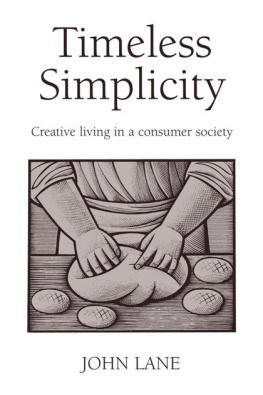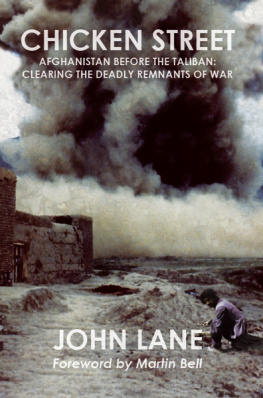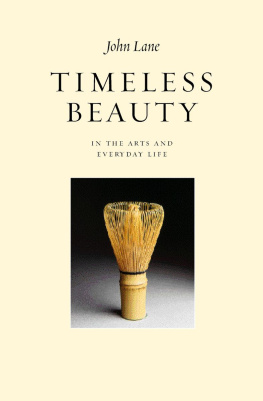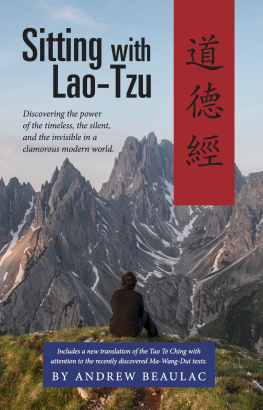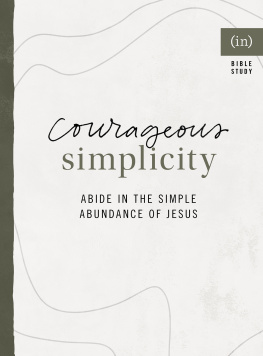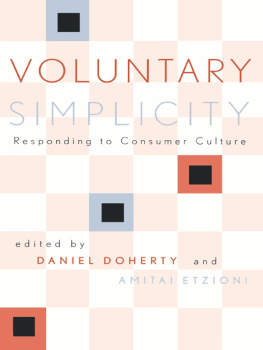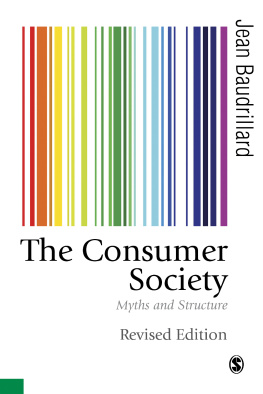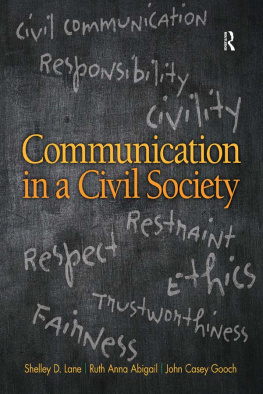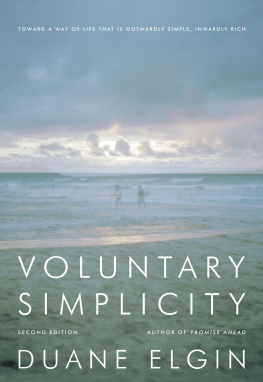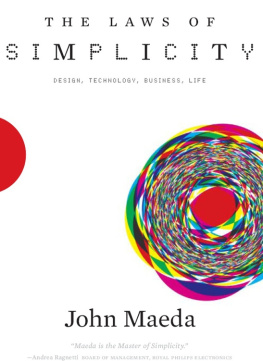John Lane - Timeless Simplicity: Creative Living in a Consumer Society
Here you can read online John Lane - Timeless Simplicity: Creative Living in a Consumer Society full text of the book (entire story) in english for free. Download pdf and epub, get meaning, cover and reviews about this ebook. year: 2000, publisher: UIT Cambridge Ltd., genre: Religion. Description of the work, (preface) as well as reviews are available. Best literature library LitArk.com created for fans of good reading and offers a wide selection of genres:
Romance novel
Science fiction
Adventure
Detective
Science
History
Home and family
Prose
Art
Politics
Computer
Non-fiction
Religion
Business
Children
Humor
Choose a favorite category and find really read worthwhile books. Enjoy immersion in the world of imagination, feel the emotions of the characters or learn something new for yourself, make an fascinating discovery.
Timeless Simplicity: Creative Living in a Consumer Society: summary, description and annotation
We offer to read an annotation, description, summary or preface (depends on what the author of the book "Timeless Simplicity: Creative Living in a Consumer Society" wrote himself). If you haven't found the necessary information about the book — write in the comments, we will try to find it.
John Lane: author's other books
Who wrote Timeless Simplicity: Creative Living in a Consumer Society? Find out the surname, the name of the author of the book and a list of all author's works by series.
Timeless Simplicity: Creative Living in a Consumer Society — read online for free the complete book (whole text) full work
Below is the text of the book, divided by pages. System saving the place of the last page read, allows you to conveniently read the book "Timeless Simplicity: Creative Living in a Consumer Society" online for free, without having to search again every time where you left off. Put a bookmark, and you can go to the page where you finished reading at any time.
Font size:
Interval:
Bookmark:
Reviews of other books by John Lane:
The Living Tree: Art and the Sacred
It is heartening that a working painter has spoken out against the stupidity and obscurantism that has disfigured much modernism in art... Lane is telling us that art can still regenerate, can still lead us towards the sacred and the ineffable. The basis of his work is to give praise. The Living Tree marks an important point in the history of art criticism which has lain dormant since Ruskin. It builds upon the pioneer work done by Titus Burckhardt in Sacred Art East and West, and Coomaraswamys studies on the traditional artist. It is a courageous attempt to reaffirm the transcendental as the true repository of artistic expression. James Cowan, author of Mysteries of the Dreamtime
John Lane summons our culture back to abiding values. Kathleen Raine, Temenos
This book gives us an almost total picture of the power and magnificence of art in all its facets. From the title one may have thought that it was an ecological book urging us to preserve the tropical rainforest, but from the sub-title one will realise that it is the living tree of being and becoming. Stefan Valouski, New Humanity
I found The Living Tree articulate, erudite and inspiring. Gay Smith, One Earth
A Snakes Tail Full of Ants: Art, Ecology and Consciousness
I loved The Living Tree, but the new one is even better. It is the best book I have ever read on what we might refer to as the philosophy of art. Edward Goldsmith, author of The Way: An Ecological Worldview and co-author of The Case Against the Global Economy
I began dipping into this ominously titled book and ended reading every word. I was riveted by the authors analysis, his uncompromising clarity and his shrewdness of exposition... It is impossible for anyone to read it without being enriched. John Papworth, Fourth World Review
I urge people to read A Snakes Tail Full of Ants and enjoy its rich territory. Denys Trussell, The Ecologist
Anyone concerned with the overt betrayal of art in our time, anyone concerned with the vital relationship between spirit, community, nature and art will find A Snakes Tail Full of Ants rewarding... It could be put with great advantage alongside Gombrichs The Story of Art. There can be little doubt that many young people... would find this book something of a revelation. Peter Abbs, Temenos Academy Review
Timeless Simplicity
Creative Living in a Consumer Society

John Lane
with illustrations by Clifford Harper

First published in 2001 by
Green Books Ltd
Foxhole, Dartington
Totnes, Devon TQ9 6EB
www.greenbooks.co.uk
Reprinted 2002, 2003, 2004, 2007, 2009
First published in ebook formats 2010
Distributed in the USA by
Chelsea Green Publishing Company
PO Box 428, White River Junction, VT05001
(800) 639-4099 www.chelseagreen.com
John Lane 20012009
All rights reserved
Illustrations Clifford Harper 20012009
Design by Rick Lawrence
Text printed by TJ International, Padstow, Cornwall, UK
on 100% recycled paper
British Library Cataloguing in Publication Data
available on request
Print format ISBN 978 1 903998 00 7
PDF format ISBN 978 1 907448 56 0
ePub format ISBN 978 1 907448 57 7
Acknowledgements
Many are the persons who have influenced and educated me in the writing of this book. Among them are the thinkers whom I have cited and quoted on the following pages, beginning with John Ruskin, Eric Gill and Henry David Thoreau, whom I was reading as a schoolboy. Visits to the Benedictine Abbeys of Quarr and Solesmes, the gardens of Kyoto, many places in India and the influence of some wonderful friends, have furthered my understanding of the subject, as have my own attempts at living with simplicity.
More particularly I should like to acknowledge my debt of gratitude to my wife, Truda, for her support and forbearance during the writing of this book (and for practising what I preach) and for Satish Kumar and John Elford for their support and constructively sympathetic editing. The book is dedicated to all whom it might concern.
Authors Note
A word needs to be said about the tricky business of his and her, and similar references to the two genders. My intention is to acknowledge both male and female genders in equal measure, but to avoid clumsiness of expression, where I have found it hard to substitute a different term, I have generally used the words man, his and him.
The industrialist was horrified to find the fisherman lying beside his boat, smoking a pipe.
- Why arent you fishing?, said the industrialist.
- Because I have caught enough fish for the day.
- Why dont you catch some more?
- What would I do with them?
- Earn more money. Then you could have a motor fixed to your boat and go into deeper waters and catch more fish. That would bring you money to buy nylon nets, so more fish, more money. Soon you would have enough to buy two boats even a fleet of boats. Then you could be rich like me.
- What would I do then?
- Then you could sit back and enjoy life.
- What do you think Im doing now?
Introduction
Civilization is a limitless multiplication of unnecessary necessities.
MARK TWAIN
T HIS IS A BOOK about simplicity not destitution, not parsimoniousness, not self-denial but the restoration of wealth in the midst of an affluence in which we are starving of the spirit. It is a book about the advantages of living a less cluttered, stressful life than that which many of us now live, in the overcrowded and manic-paced consuming nations. It is a book that rejects the sense of continual deprivation, the idea that there are always new necessities. It is a book that has nothing to do with subsistence living on the Lake Isle of Innisfree, but everything to do with having less and enjoying more: enjoying time to do the work you love, enjoying time to spend with your family, enjoying time to pursue creative projects, enjoying time for good eating, enjoying time just to be.
It has two related themes. One is that life at the beginning of the 21st century is not what it should be. It seems that our economic and technological progress has failed to bring about the good society; a higher standard of living has become the unofficial agent of oppression. It has simply failed to result in a better quality of life. Modern culture has encouraged the delusion that consumption provides a palliative for the unease which characterizes many lives. This is the exact opposite of the truth. Material solutions to emotional problems leave behind a sense of personal dissatisfaction. A simpler lifestyle leaves space for ones spiritual renewal.
The other theme of the book concerns the future of our home, the Earth. Up to the end of the 19th century, the Earth consisted of a world of oceans and land masses teeming with all kinds of life; but our grandchildren will inherit one with less than 20 per cent of its early forests still intact, with most of its readily available freshwater already spoken for, with most of its wetlands and reef systems either destroyed or degraded. Even now, thousands of plant and animal species are becoming extinct a diminution which represents the greatest loss of life on Earth since the extinction of the dinosaurs roughly 65 million years ago. Sooner or later a more frugal lifestyle will not only prove desirable but become imperative.
Next pageFont size:
Interval:
Bookmark:
Similar books «Timeless Simplicity: Creative Living in a Consumer Society»
Look at similar books to Timeless Simplicity: Creative Living in a Consumer Society. We have selected literature similar in name and meaning in the hope of providing readers with more options to find new, interesting, not yet read works.
Discussion, reviews of the book Timeless Simplicity: Creative Living in a Consumer Society and just readers' own opinions. Leave your comments, write what you think about the work, its meaning or the main characters. Specify what exactly you liked and what you didn't like, and why you think so.

